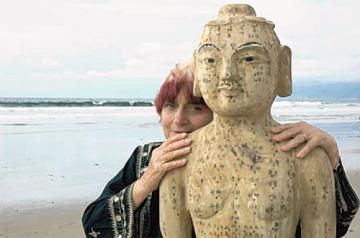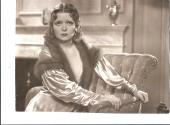'Beaches of Agnes' a soulful, brilliant documentary reflection
At one point in the totally enchanting "Beaches of Agnes," its heroine says, "I know my classics, and I know my friends." What more do you need?
You don't need anything more to fall in love with Agnes Varda by the end of her documentary autobiopic -- if you weren't already in love with her before. The Lord was in an unusually generous mood the day He invented Varda. As if film-photographic-writing gifts were not enough, He bestowed upon her the most mesmerizing female speaking voice since -- I dunno, Garbo? Audrey Hepburn? Whatever she narrates or remembers, there's never a note of cloying nostalgic, regret or histrionic melodrama. It's the voice of a woman whose cup runneth over with life, energy and youthful wonder at the tender age of 81.
A seminal Nouvelle Vague director, Varda was the lone fille among the garçons of the French New Wave. With her trained photographer's eye, she'd eventually reject "the tyranny of the sharp image" in favor of the blurred one but was brilliantly capable of both. The title's derivation stems from her childhood love of the Belgian beaches where she grew up and of houseboat life in the Vichy France of World War II. She returns there but -- with typical honesty -- deems that "Return Home" part of the film "a flop."
More compelling are her experiences as an enthusiastic chronicler of the Chinese and Cuban revolutions, followed by her difficult entry into a film world of men who intimidated her -- Godard, Resnais, Chabrol, Truffaut. Chief among them: Jacques Demy ("Umbrellas of Cherbourg"), her life partner from 1962 until his death in 1990.
At first, she says, "I thought if you just paired images with words, you'd get cinema." She soon discovered -- and helped worldwide audiences discover -- it was something else, with her groundbreaking "Cleo From 5 to 7," a harbinger of later films such as "Vagabond" that probed the complexities of life's planned and accidental collisions.
Along the way, she was a "Gleaner" (the title of one of her best films) of found and discarded objects -- life's empty picture frames. In this film, "I wanted to be like a bird," she says, "free in my memory to go from one place to another and see what I would find." In that process, we see her literally walking backward at times through the old, yet always open to the new.
"Beaches" is not without its flaws, including Chris Marker's outlandish appearance as her interlocutor in a Garfield-cat suit. The gimmick doesn't work, but the great thing about Varda is that she knows it and says so ("I'll have to put up with him").
Overall, the film is a marvelous collage of both the whimsy and precision of her mind. "We'd say, 'We're going up to Paris' -- as if France were vertical," she observes, and describes Fidel Castro as "a tall utopian with stone wings" -- supplying her own iconic still-photo portrait of him to prove it. "Beaches" is part-impressionist, part-surrealist, part-Dadaist -- an eclectic bit of everything. Because there are no beaches in Paris, Varda creates one in the middle of a busy street, with office workers at their desks in bathing suits.
No other autobiographical film I know is so devoid of angst and psychological misery -- its maker so joyful and at peace with herself, her life and her work. It is helpful but not essential to know her previous films. How many has she made -- about 25? This one might be called "25 1/2," her rough (no, polished) equivalent of Fellini's "8 1/2" but lighter, brighter, less symbolically contrived.
It's hard to select a favorite from Varda's myriad of stunning images, all perfectly composed and edited without one extra frame in any shot. One of them is her funny moment in the reconstructed belly of Jonah's whale! But if forced to choose, I'd pick the exquisite trapeze shot on the strand of a placid ocean, with acrobats' shadows dancing on the sand below.
O, to be shipwrecked on "The Beaches of Agnes" -- you'd never want to be rescued.
[END]






